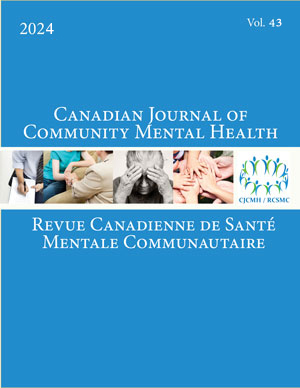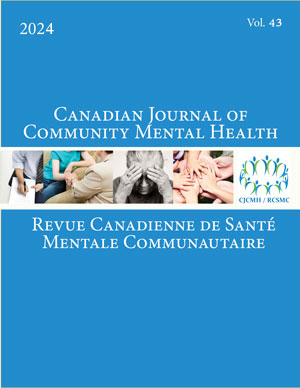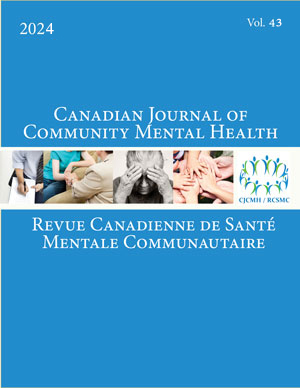Volume 26 • Number 2 • September 2007
OPEN ACCESS
Les personnes vivant avec le VIH sont souvent confrontées à la prise d'un traitement contraignant et générateur d'effets secondaires, qui bouleverse leur vie personnelle et sociale. Si des recherches ont mis en évidence les bénéfices de la participation à un groupe de soutien ou d'entraide dans la gestion des difficultés liées à l'infection à VIH, aucune ne porte spécifiquement sur les apports de ces groupes en matière de gestion de la vie avec un traitement antirétroviral. S'appuyant sur une étude ethnologique, cet article tente de montrer dans quelle mesure un groupe de parole associatif sur les traitements constitue une ressource pour soutenir les personnes dans leurs difficultés psychosociales liées au traitement mais également pour les rendre plus autonomes et actives dans les décisions thérapeutiques.
OPEN ACCESS
Autonomy with respect to psychostimulant medication for children has proven to be problematic in the face of the many influence processes at work in a climate of uncertainty and controversy over both the diagnosis of attention deficit disorder with or without hyperactivity (ADHD) and the medications associated with it, Ritalin® and analogous medications (RAM). The reconstruction of these influence processes using the framework of social representations theory allowed, in turn, for the reconstruction of a rather complex set of social dynamics based on a review of the literature. Among other things, this investigation revealed a landscape dominated by groups of professionals, where collaboration is more purposive than operative. In this context parents are subject to a concentration of influences in the form of pressure and scientific legitimation exerted mainly by groups of professional and scientific actors.
OPEN ACCESS
Les médicaments occupent une place croissante dans les pratiques en santé mentale, particulièrement dans le champ de la psychose. Toutefois, la valeur qui leur est associée sur la scène clinique est largement paradoxale, symbolique autant que fonctionnelle. Des entrevues avec des personnes de diverses cultures en début de psychose et avec des proches et des intervenants et intervenantes révèlent la place centrale des médicaments dans la négociation des significations et des pratiques: leur efficacité paradoxale, l'incertitude, leur fonction de passeur; la question des limites de l'espace clinique. La notion d'autonomie se voit mise au travail à chacun de ces niveaux.
OPEN ACCESS
This paper shares the experiences of 3 occupational therapists whose work has been guided by health promotion and mental health promotion principles while using community development strategies. Although health promotion has been lauded for over 2 decades as a useful model from which to practice community occupational therapy, few illustrations of its application to practice exist. The Ottawa Charter for Health Promotion is reviewed as a starting point from which to frame mental health promotion and community development strategies. Two group programs are presented to illustrate an occupational therapy application of the health promotion model and community development strategies within a primary health care setting. Lessons learned from the therapists' work are shared in terms of conceptual understandings of community occupations, consumer barriers to participation, sustainability of community development projects, and balancing individual client issues with community-level interventions. The programs exemplify the role of occupational therapy in the development of community participation opportunities for interested individuals.
OPEN ACCESS
This paper presents findings from a qualitative study which examined the health implications of community restructuring (social, economic, environmental, and industrial change) for youth living in a small coastal community in Newfoundland, Canada. Eleven focus groups with youth ages 13–24 (n = 74) were conducted to obtain their perceptions on the impacts of the community restructuring that has occurred since the 1992 cod moratorium. Researcher observations over 5 visits were also part of the methodology. From the perspective of youth, significant losses have occurred within the community that have negatively affected their emotional and social health. At the same time, some aspects of the community have been relatively untouched by the changes and are reported to play a positive role in the youth's sense of well-being. However, current trends of youth leaving the community in search of economic stability may rupture these positive ties, which could have far-reaching negative implications as the youth move into adulthood.
OPEN ACCESS
Collective kitchens are community-based cooking programs in which small groups of people cook in bulk. The limited research literature is in agreement that their social benefits are important. This article presents qualitative data from collective kitchen members exploring the social support developed through participation in three Canadian cities: Saskatoon, Toronto, and Montreal. Important themes that emerged include building friendships, breaking social isolation, increasing participation in community activities, and using the group as a means for sharing community resources and information. Overall, activities that encouraged socializing and the sharing of life experiences were important to the positive experiences associated with participation.
OPEN ACCESS
Family members caring for a frail, depressed, or cognitively impaired senior play an important role in our health care system. However, they require support in this role. Family support groups have emerged as an important means of providing this reinforcement. In British Columbia, the Caregivers Association of BC (CABC) played an active role during the mid-1990s in facilitating the development of a network of support groups across the province. The purpose of this study is to explore, through an intensive community consultation process, how these groups are faring within the context of health care regionalization.
OPEN ACCESS
This study examined the clinical and social characteristics of clients (N = 110) in a retrospective chart review from a 1-year continuous psychiatric consultation series in the Inuit community of Iqaluit, Nunavut. Interpersonal and socio-environmental stressors were found to be unusually extensive and the primary precipitators of psychiatric crises such as suicide attempts. Negative health determinants such as unemployment, overcrowding, domestic violence, substance abuse, and legal charges were also prevalent. Psychiatric issues in the Arctic appear deeply interwoven with interpersonal, socioeconomic, and societal changes; effective community mental health services must address a broad spectrum of psychosocial issues beyond the medical model.
OPEN ACCESS
Poor safety climate and incivility have been linked to worse work organization-related practices and high accident rates. This study investigates the influence of safety climate and incivility on the use of a recommended operating room (OR) practice, the hands-free technique (HFT), among OR nurses in four hospitals in Ontario and British Columbia. Of the 87 nurses who completed self-administered questionnaires, 82% perceived safety climate as “not good” and 49% reported supervisor incivility. Incivility correlated with worse safety climate on the communication/conflict subscale. Better safety climate on the management support subscale and less supervisor incivility predicted HFT use.
OPEN ACCESS
OPEN ACCESS
OPEN ACCESS










